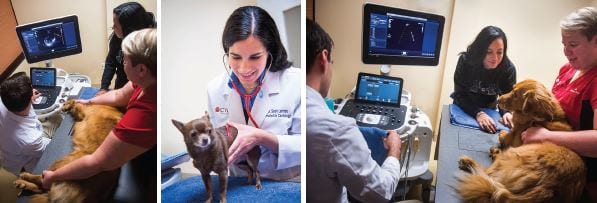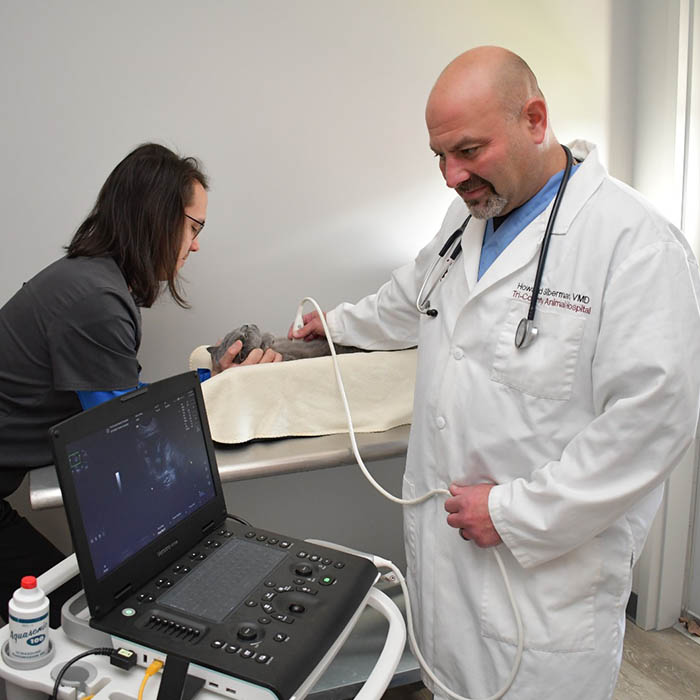Checking Out the Vital Solutions Used by a Veterinary Cardiologist: Understanding Ultrasound and CT Check Methods
Vet cardiologists play a crucial function in the health of pets by diagnosing and dealing with different heart disease. They utilize innovative imaging methods, such as cardiac ultrasound and CT scans, to provide exact assessments. Each method has its distinctive advantages and applications. Understanding these strategies is necessary for animal proprietors seeking the most effective take care of their buddies. What factors should family pet owners consider when picking between these analysis tools?

The Duty of Veterinary Cardiologists in Pet Healthcare
Veterinary cardiologists play a crucial duty in the medical care of pets, focusing particularly on identifying and dealing with heart-related problems. They possess specialized training that enables them to translate complicated diagnostic tests and identify various cardiovascular issues. These professionals make use of innovative strategies, such as echocardiography and electrocardiography, to analyze heart function and structure accurately.Veterinary cardiologists likewise establish tailored treatment plans that may consist of medications, way of living modifications, and, in many cases, surgical interventions. Their competence reaches informing pet owners concerning heart wellness, highlighting the value of routine check-ups and very early detection of potential troubles. Partnership with general vets is vital, as it assures detailed treatment for animals with suspected cardiac problems. By offering specialized services, veterinary cardiologists substantially boost the quality of life for family pets and offer comfort for their owners, reinforcing the relevance of heart health and wellness in overall pet health.
Common Heart Problems in Pets
Typical cardiac problems in animals can greatly influence their health and lifestyle. Heart murmurs, numerous types of cardiomyopathy, and hereditary heart defects are amongst the most widespread conditions that vets encounter. Cancer Veterinary Near Me. Comprehending these issues is necessary for family pet owners to ensure prompt diagnosis and proper treatment
Heart Murmurs in Pets
Heart whisperings can be a resource of concern for family pet proprietors, they are not always indicative of severe wellness issues. A heart murmur is an irregular audio produced by rough blood flow within the heart. In animals, these murmurs can be triggered by numerous variables, including genetic heart issues, valve concerns, or also tension throughout exams. Many pet dogs with heart whisperings lead regular lives without considerable health impacts. To determine the underlying cause, veterinary cardiologists usually employ analysis strategies such as echocardiograms and Doppler ultrasounds. Early discovery and evaluation are important, as they may aid manage any type of possible heart issues effectively. Animal proprietors are motivated to consult their veterinarian for a complete analysis if a heart whispering is spotted.
Cardiomyopathy Kind Explained
Cardiomyopathy incorporates a group of diseases influencing the heart muscle mass, bring about endangered heart function in pets. One of the most common kinds consist of expanded cardiomyopathy (DCM), hypertrophic cardiomyopathy (HCM), and restrictive cardiomyopathy (RCM) DCM largely affects pets, causing the heart to damage and enlarge, which diminishes its capability to pump blood efficiently. On the other hand, HCM is more widespread in cats, identified by the enlarging of the heart wall surfaces, typically resulting in blocked blood flow. RCM, though much less common, happens when the heart muscle mass becomes rigid, limiting its capability to loaded with blood. Each kind provides special difficulties in medical diagnosis and treatment, necessitating specialized vet cardiological examination to guarantee peak monitoring and care for influenced animals.
Genetic Heart Flaws
Genetic heart problems stand for a significant group of cardiac problems in pets, unique from gotten conditions such as cardiomyopathy - Ultrasound For Dogs. These problems are architectural abnormalities present at birth, influencing the heart's normal function. Usual kinds include license ductus arteriosus, ventricular septal issues, and pulmonic stenosis. Symptoms may differ extensively, ranging from moderate to serious, and can consist of exercise intolerance, coughing, and difficulty breathing. Early medical diagnosis through sophisticated imaging strategies like ultrasound is essential for effective administration. Vet cardiologists play an essential function in recognizing these problems and recommending suitable treatment options, which may include clinical management or medical treatment. Identifying genetic heart defects enables better outcomes and enhanced lifestyle for influenced pets
Understanding Cardiac Ultrasound: Exactly How It Works
A considerable number of veterinary practices currently make use of heart ultrasound as a necessary analysis device for reviewing heart wellness in pets. This non-invasive strategy utilizes high-frequency acoustic waves to produce pictures of the heart's structure and function. Throughout the treatment, a vet service technician uses a gel to the pet's upper body and makes use of a transducer to emit ultrasound waves. These waves jump off the heart and bordering frameworks, producing real-time images on a monitor.Veterinarians can analyze numerous elements of cardiac health, consisting of chamber dimension, wall surface movement, and valve feature. In addition, cardiac ultrasound enables the discovery of problems such as liquid build-up and congenital heart defects. This strategy is crucial for identifying conditions that might not show up through conventional radiographs. By offering comprehensive details regarding the heart's anatomy and visit this page efficiency, cardiac ultrasound aids in creating efficient treatment strategies for animals experiencing cardiovascular disease.
The Importance of CT Checks in Identifying Heart Conditions
Just how do CT scans improve the diagnosis of heart problems in veterinary medication? CT scans provide detailed cross-sectional photos of the heart and surrounding frameworks, allowing vets to imagine intricate anatomical partnerships. This imaging strategy is particularly beneficial in determining hereditary heart issues, cardiac lumps, and abnormalities in capillary. By utilizing advanced imaging formulas, CT scans can assess heart chamber sizes and feature, offering a complete view that may be hard to attain with conventional methods.Additionally, CT angiography can visualize blood circulation and recognize areas of stenosis or blockage, which is important for intending prospective treatments. The rate and precision of CT scans likewise assist in fast diagnoses, important in emergency scenarios. Eventually, the unification of CT checks into veterinary cardiology significantly improves the precision of medical diagnoses, making it possible for targeted therapy strategies and improving person outcomes for animals experiencing from heart problems.
Contrasting Ultrasound and CT Check Techniques
While both ultrasound and CT scans are indispensable devices in veterinary cardiology, they use distinctive benefits and limitations that influence their use in diagnosing heart disease. Ultrasound, or echocardiography, offers real-time imaging of the heart's structure and function, allowing veterinarians to evaluate heart chambers, valves, and blood flow. It is particularly effective for reviewing problems like coronary infarction and cardiomyopathy. Nevertheless, ultrasound may be limited in imagining certain anatomical structures due to patient size or obesity.In contrast, CT checks deal comprehensive cross-sectional pictures of the heart and surrounding cells, making them excellent for determining structural irregularities, tumors, or vascular concerns. Although CT scans offer comprehensive insights, they call for sedation and may include radiation direct exposure. Eventually, the choice in between ultrasound and CT scans relies on the particular clinical situation, the person's problem, and the information needed for an accurate medical diagnosis.
Treatment Options Available Via Veterinary Cardiology
Vet cardiology provides a series of therapy options customized to deal with numerous heart conditions in pets. Treatment plans often begin with way of living alterations, including diet adjustments and exercise modifications, targeted at boosting overall heart health and wellness. Medications play an essential role, with cardiologists recommending medicines such as diuretics, beta-blockers, and ACE inhibitors to improve and manage signs and symptoms heart function.In much more extreme instances, interventional procedures, such as balloon valvuloplasty or stent positioning, may be essential to ease blockages or enhance blood circulation. For particular congenital heart flaws, medical alternatives may be explored to deal with structural problems. Furthermore, continuous tracking and follow-up care are necessary components of an extensive therapy plan, permitting timely changes based on the family pet's feedback to treatment. On the whole, veterinary cardiology concentrates on providing Recommended Reading reliable, personalized care to enhance the health and well-being of pet people with heart disease.
Just how to Prepare Your Pet Dog for a Heart Evaluation
Preparing a pet for a cardiac evaluation is vital to ensure exact outcomes and a smooth procedure. Owners ought to initially arrange the visit with the vet cardiologist and review any specific requirements or problems. It is a good idea to hold back food for a minimum of 12 hours before the analysis, as this assists boost imaging top quality during treatments like ultrasound or CT scans.Additionally, keeping a calm setting on the day of the consultation can aid lower the pet dog's anxiousness. It is advantageous to bring along any kind of pertinent clinical records, consisting of previous tests and medicines (Board Certified Veterinary Cardiologist). Owners must likewise make particular that their animal fits and leashed during transportation to the center. Ultimately, familiarizing themselves with the analysis process can alleviate fears and assist in asking informed questions throughout the appointment. By adhering to these steps, proprietors can add significantly to the efficiency of the cardiac examination
Often Asked Inquiries
How much time Does a Heart Ultrasound or CT Check Take?
The duration of a cardiac ultrasound usually varies from 30 to 60 mins, while a CT scan may take around 15 to half an hour. Elements such as the client's problem can influence these time price quotes.

Exist Any Risks Connected With These Analysis Procedures?

Can I Keep With My Pet Dog Throughout the Treatment?
The vet center's plan typically dictates whether family pet owners can remain during procedures. While some clinics urge proprietor presence for comfort, others may require splitting up to guarantee security and optimal conditions for diagnostic imaging.
Just how much Do These Analysis Tests Generally Cost?
The costs of diagnostic tests, such as ultrasound and CT scans, normally differ based on location and facility. Commonly, rates range from a few hundred click here now to over a thousand bucks, reflecting the complexity and innovation involved.
What Is the Recovery Refine After a Heart Analysis?
The recuperation procedure after a cardiac analysis includes keeping an eye on the animal for any type of prompt reactions, guaranteeing convenience, and restricting physical activity. Vets normally provide post-evaluation guidelines to direct animal proprietors during this vital recovery duration. Heart murmurs, numerous kinds of cardiomyopathy, and hereditary heart problems are among the most common conditions that vets experience. A heart whispering is an abnormal noise generated by rough blood circulation within the heart. Cardiomyopathy includes a team of conditions influencing the heart muscular tissue, leading to compromised heart feature in pet dogs. Genetic heart defects stand for a significant category of heart problems in pets, distinctive from obtained problems such as cardiomyopathy. Ultrasound, or echocardiography, offers real-time imaging of the heart's framework and feature, permitting vets to analyze heart chambers, shutoffs, and blood circulation.